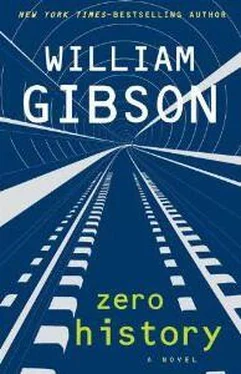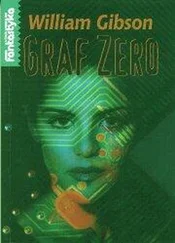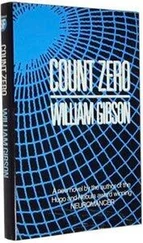William Gibson - Zero history
Здесь есть возможность читать онлайн «William Gibson - Zero history» весь текст электронной книги совершенно бесплатно (целиком полную версию без сокращений). В некоторых случаях можно слушать аудио, скачать через торрент в формате fb2 и присутствует краткое содержание. Жанр: Фантастика и фэнтези, на чешском языке. Описание произведения, (предисловие) а так же отзывы посетителей доступны на портале библиотеки ЛибКат.
- Название:Zero history
- Автор:
- Жанр:
- Год:неизвестен
- ISBN:нет данных
- Рейтинг книги:4 / 5. Голосов: 1
-
Избранное:Добавить в избранное
- Отзывы:
-
Ваша оценка:
- 80
- 1
- 2
- 3
- 4
- 5
Zero history: краткое содержание, описание и аннотация
Предлагаем к чтению аннотацию, описание, краткое содержание или предисловие (зависит от того, что написал сам автор книги «Zero history»). Если вы не нашли необходимую информацию о книге — напишите в комментариях, мы постараемся отыскать её.
Zero history — читать онлайн бесплатно полную книгу (весь текст) целиком
Ниже представлен текст книги, разбитый по страницам. Система сохранения места последней прочитанной страницы, позволяет с удобством читать онлайн бесплатно книгу «Zero history», без необходимости каждый раз заново искать на чём Вы остановились. Поставьте закладку, и сможете в любой момент перейти на страницу, на которой закончили чтение.
Интервал:
Закладка:
“What is my business?” asked Milgrim.
“Did you like Hollis Henry?”
“She seemed… familiar?”
“She was a singer. In a band. The Curfew.”
Milgrim remembered a large silvery black-and-white photograph. A poster. A younger Hollis Henry with her knee up, her foot on something. A tweed miniskirt, that seemed mostly to have unraveled, drawn taut. Where had he seen that?
“You’ll be working with her,” said Bigend. “A different project.”
“Translating?”
“I doubt it. This one is apparel-based as well.”
“Back in Vancouver,” Milgrim began, then stopped.
“Yes?”
“I found a woman’s purse. There was quite a lot of money in it. A phone. A wallet with cards. Keys. I put the purse and the wallet and the cards and the keys in a mailbox. I kept the money and the phone. You started phoning. I didn’t know you. We started talking.”
“Yes,” said Bigend.
“That’s why I’m here today, isn’t it?
“It is,” said Bigend.
“Whose phone was that?”
“Do you remember that there was something else in that purse? A black plastic unit, roughly twice the size of the phone?”
Milgrim did now. He nodded.
“That was a scrambler. It belonged to me. The person whose purse you found was an employee of mine. I wanted to know who had her phone. That was why I tried the number.”
“Why did you keep phoning back?”
“Because I became curious about you. And because you kept answering. Because we began to have a conversation that led eventually to our meeting, and, as you say, to your being here today.”
“Did it cost more to have me here today than…” Milgrim thought about it. “More than the Toyota Hilux?” He felt as though his therapist were watching him.
Bigend’s head tilted slightly. “I’m not certain, but it probably did. Why?”
“That’s my question,” said Milgrim. “Why?”
“Because I knew about the clinic in Basel. It’s highly controversial, very expensive. I was curious as to whether or not it would work, with you.”
“Why?” asked Milgrim.
“Because,” Bigend said, “I’m a curious person, and can afford to satisfy my curiosity. The doctors who examined you in Vancouver were not optimistic, to put it mildly. I like a challenge. And even in the condition I found you in, in Vancouver, you were an exceptional translator. Later”-and Bigend smiled-“it became evident that you have an interesting eye for a number of things.”
“I’d be dead now, wouldn’t I?”
“My understanding is that you probably would be, if you’d been withdrawn from the drug too quickly,” Bigend said.
“Then what do I owe you?”
Bigend reached for the shotgun, as though he were about to tap it with his finger, then caught himself. “Not your life,” he said. “That’s a by-product. Of my curiosity.”
“All that money?”
“The cost of my curiosity.”
Milgrim’s eyes stung.
“This is not a situation in which you’re required to thank me,” Bigend said. “I hope you understand that.”
Milgrim swallowed. “Yes,” he said.
“I do want you to work with Hollis on this other project,” Bigend said. “Then we’ll see.”
“See what?”
“What we see,” said Bigend, reaching across the shotgun for the gray folder. “Go back to the hotel. We’ll phone you.”
Milgrim stood, lowering the Hackett bag, which had been covering the startled-looking digital portrait of himself he wore around his neck, on its lanyard of chartreuse nylon.
“Why are you wearing that?”
“It’s required,” said Milgrim. “I don’t work here.”
“Remind me to fix that,” said Bigend, opening the gray folder, which contained a thick sheaf of what appeared to be clippings from Japanese magazines.
Milgrim, who was already closing the door behind him, said nothing.
13. MUSKRAT
They ate muskrat,” Heidi said as they walked in gritty sunlight to Selfridges, for her appointment with Hollis’s stylist, “but only on Fridays.”
“Who?”
“Belgians. Got the church to say it was okay, because muskrats live in the water. Like fish.”
“That’s ridiculous.”
“It’s in the Larousse Gastronomique ,” said Heidi. “Look it up. Or just look at your boy. You can see he’s had some.”
Hollis’s iPhone rang as they were nearing Oxford Street. She looked at the screen. Blue Ant.
“Hello?”
“Hubertus.”
“You eat muskrat, Fridays?”
“Why do you ask?”
“I’m defending you from a racial slur.”
“Where are you?”
“On my way to Selfridges with a friend. She’s getting her hair cut.” Getting Heidi the last-minute appointment had required epic stylist-suckery, but Hollis was a firm believer in the therapeutic power of the right haircut. And Heidi, for her part, now seemed neither hungover nor jet-lagged.
“What are you doing while she does that?” asked Bigend.
Hollis debated telling Bigend she was getting a cut herself, but it didn’t seem worth it. “What do you have in mind?”
“The friend we had tapas with,” he said. “I want you two to talk.”
The translator, the one who liked dogs. “Why?”
“That will emerge. Talk while your friend has her hair cut. I’ll have Aldous run him over now. Where shall he meet you?”
“The food hall, I suppose,” said Hollis. “Patisserie.”
He hung up.
“Shit,” said Hollis.
“Muskrat,” said Heidi, pulling Hollis in beside her and taking on the remorseless afternoon pedestrian-flow of Oxford Street like a broad-shouldered icebreaker, homing on Selfridges. “You really are working for him.”
›››
“Hollis?”
She looked up. “Milgrim,” she said, remembering his name, which Bigend had been unwilling to use over the phone. He’d shaved, and looked rested. “I’m having a salad. Would you like something?”
“Do they have croissants?”
“I’m sure they do.” There was something she found deeply peculiar about his affect, even in this brief an exchange. He seemed genuinely mild, amiable, but also singularly alert, in some skewed way, as if there were something else looking out, around corners, swift and peripheral.
“I think I’ll have one,” he said, quite seriously, and she watched him walk to the nearby counter. He wore darker trousers today, the same thin cotton sportscoat.
He returned with his white tray. A croissant, a small rectangular slice of some compacted meat product in a pastry shell, and a cup of black coffee.
“You’re a Russian translator, Mr. Milgrim?” she asked as he put down the tray and took a seat.
“Just Milgrim,” he said. “I’m not Russian.”
“But a translator of Russian?”
“Yes,” he said.
“Do you do that for Hubertus? For Blue Ant?”
“I’m not a Blue Ant employee. I suppose I’m freelance. I’ve done some translation for Hubertus. Mostly literary.” He looked hungrily at his tray.
“Please,” she said, picking up her salad fork. “Go ahead. We can talk afterward.”
“I missed lunch,” he said. “I have to eat, with my medication.”
“Hubertus mentioned you were recovering from something.”
“Drugs,” he said. “I’m an addict. Recovering.” And the peripheral thing was right there, peering around some inner angle, taking her measure.
“Which ones?”
“Prescription tranquillizers. That sounds respectable, doesn’t it?”
“I suppose it does,” she said, “although I don’t imagine it makes it any easier.”
“It doesn’t,” he said, “but I hadn’t had a prescription for anything for quite a long time. I was a street addict.” He cut a neat slice from one end of his cold meat tart.
Читать дальшеИнтервал:
Закладка:
Похожие книги на «Zero history»
Представляем Вашему вниманию похожие книги на «Zero history» списком для выбора. Мы отобрали схожую по названию и смыслу литературу в надежде предоставить читателям больше вариантов отыскать новые, интересные, ещё непрочитанные произведения.
Обсуждение, отзывы о книге «Zero history» и просто собственные мнения читателей. Оставьте ваши комментарии, напишите, что Вы думаете о произведении, его смысле или главных героях. Укажите что конкретно понравилось, а что нет, и почему Вы так считаете.











